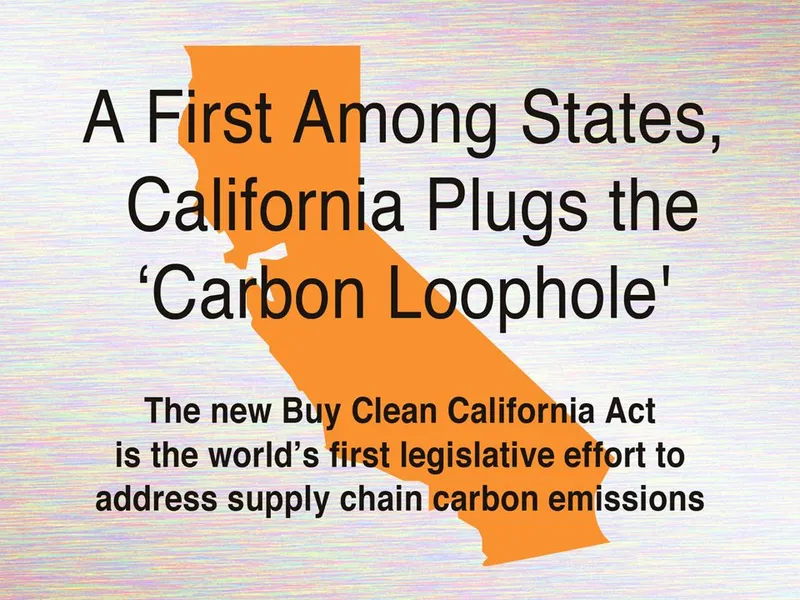
A First Among States, California Plugs the 'Carbon Loophole' – The new Buy Clean California Act is the world’s first legislative effort to address supply chain carbon emissions.
Elizabeth Daigneau / www.governing.com / Nov. 30, 2017
In early 2006, the California Department of Transportation put out a bid for work on the San Francisco-Oakland Bay Bridge. Several steel mills from around the West Coast threw their hats in. But ultimately, it was a mill 6,500 miles away in China that won. California’s steel mills were furious.
The decision was controversial for a lot of reasons. But for California steel mills, the issue was simple: They have to comply with some of the strictest pollution rules in the world. Because of that, they’ve invested in clean technology that produces half the emissions (or less) per ton of steel than the dirtiest mills. But, they argued, there was no market advantage to them for making their product cleaner; the playing field wasn’t level. The Sierra Club of California and the BlueGreen Alliance, which is a national organization that connects labor with environmental issues, agreed. There was indeed no requirement that the state Department of Transportation select the cleaner steel. Why not then, the groups wondered, make one?
Enter the Buy Clean California Act, the world’s first legislative effort to address supply chain carbon emissions. The act, which Gov. Jerry Brown signed into law in October, requires state agencies to consider the carbon footprint of materials used in infrastructure projects when purchasing steel, flat glass and mineral wool, which is a broad category of insulation for buildings.
The idea of targeting supply chain emissions isn’t new. Greenpeace, for instance, has the Click Green campaign that tries to encourage large technology companies to buy 100 percent renewable energy. But the Buy Clean California Act is the first legislative iteration of such efforts.
It targets something climate policymakers call “the carbon loophole.” More than 20 percent of the world’s greenhouse gas emissions are caused by the manufacture of products in one state, but consumed in another. But states can only directly regulate the emissions that come from within their borders; they can’t make other states adhere to their standards. “What happens is you pass a regulation in California and the industries that don’t want to comply move away. They can therefore continue polluting at the same rate,” says Matthew Lewis, a communications consultant for the ClimateWorks Foundation, one of the organizations behind the law. “That’s the carbon loophole, and the problem we’re addressing with the Buy Clean California Act.”
The law is backed by labor unions, industrial factories and environmentalists because it has something for everyone: The state spends about $10 billion a year on infrastructure, and under the law, a large chunk of that money will now be directed at low-carbon suppliers.
Buy Clean formally takes effect in 2019, but state agencies will begin working on it next year. They are tasked with identifying benchmarks, adopting them and adding them to the procurement process. While the law only targets steel, glass and mineral wool, “we’re hoping to expand that to include more categories in the next year,” says Lewis. “There’s an appetite both among the legislature and governor’s office -- and really by California voters who overwhelming support climate policy at the state level -- to eventually cover all products purchased by the state of California.”
Already, California has received inquiries about replicating the law in other states and at least one European country. “What we hope will happen is that any factory that makes any covered product will look at the California market and say, ‘That’s a big enough market for us to also invest in cleaner processes and cleaner technologies,”’ says Lewis. “This is also something state and local governments can do on their own.”
Recent Posts
- The 2022 Audi Q4 e-Tron SUV combines performance, practicality and luxury
- Ford's 2022 F150 Lightning All-Electric Truck is in high demand
- Legendary Audi performance is at the heart of the 2022 Audi e-tron GT and its RS sibling.
- Meet the Lexus RZ 450e – the luxury brand’s 1st EV
- The 2022 GV60 is Genesis’ first all-electric vehicle

